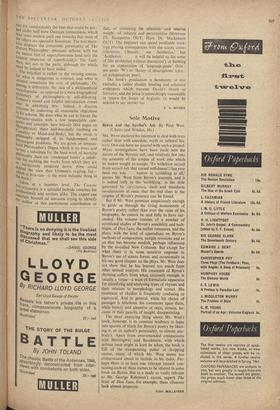Sole Motive
Byron and the Spoiler's Art. By Paul West. (Chatto and Windus, 18s.) MR. WEST declares his intention to deal with texts rather than with anecdote, myth or cultural his- tory. One can have no quarrel with such a project. Many investigations have been made into the nature of the Byronic self, and relatively few into the anatomy of the corpus of work into which its maker sought to escape. `To withdraw myself from myself (oh that cursed selfishness!) has ever been my sole . . . motive in scribbling at all,' quotes Mr. West from Byron's journals, and it is indeed only in the `scribbling,' in the style governed by sprezzatura, dash and mandarin neoclassicism at once, that the real clues to the enigma of Byron's presence can be found.
But if Mr. West promises auspiciously enough to guide us through the living monuments of Byron's poetry rather than over the ruins of his biography, he cannot be said fully to have suc- ceeded. His volume consists of a number of correlated studies of Byron's sensibility and tech- nique, of Don Juan, the earlier romances, and the plays, with the kind of appendices on Byron's methods of composition, sample revisions and so on that has become modish, perhaps influenced by the so-called New Criticism. But except for what there is in some sensitive response to Byron's use of stanza forms, and occasionally in his one good chapter on the plays, Mr. West does not show that he has learned too much from other textual analysts. His treatment of Byron's rhyming suffers from what, curiously enough, is usually a virtue—a want of formalistic apparatus for classifying and analysing types of rhymes and their relation to morphology and syntax. His treatment of rhythm is frequently confusing or equivocal. And in general, while his choice of passages is felicitous, his comments upon them, while breezy and attentive at once, remain, be- cause of their paucity of insight, disappointing.
The most annoying thing about Mr. West's book, however, is its constant tendency to lapse into spasms of blurb for Byron's poetry by liken- ing it, or its author's personality, to almost any- body's. Apart from over-extended comparisons with Hemingway and Baudelaire, with which serious issue might at least be taken, the book is full of the exasperating patter of dropping names, many of which Mr. West seems too embarrassed about to include in his index. Per- haps there is at least one relevant remark con- taining each of these names to be uttered in some book on Byron. But in a study so vastly inferior to Mr. George Ridenour's recent, superb The Style of Don Juan, for example, these allusions look almost desperate.
JOHN HOLLANDER






































 Previous page
Previous page